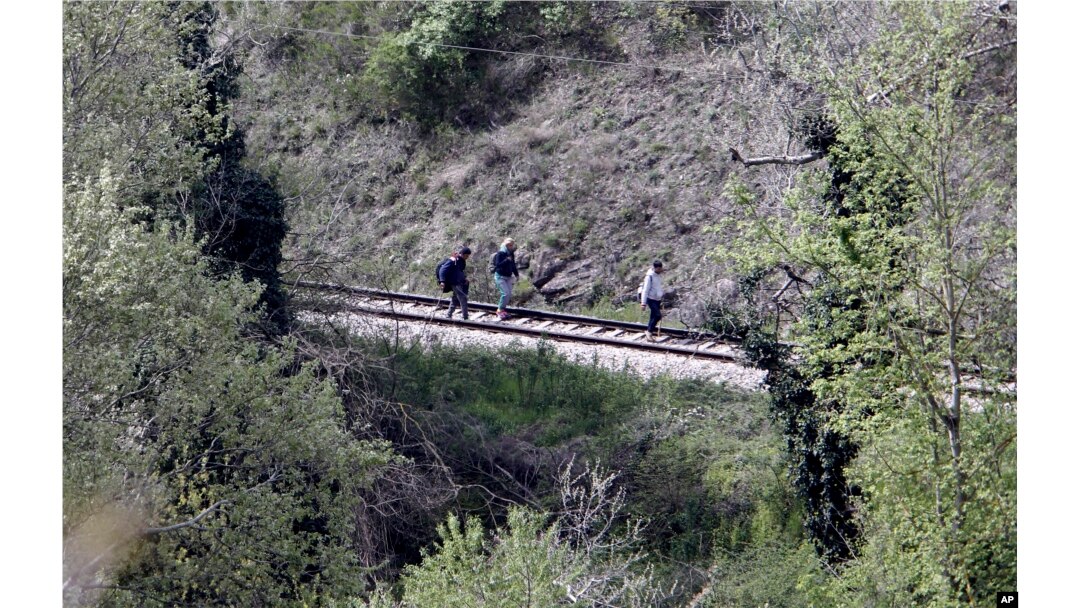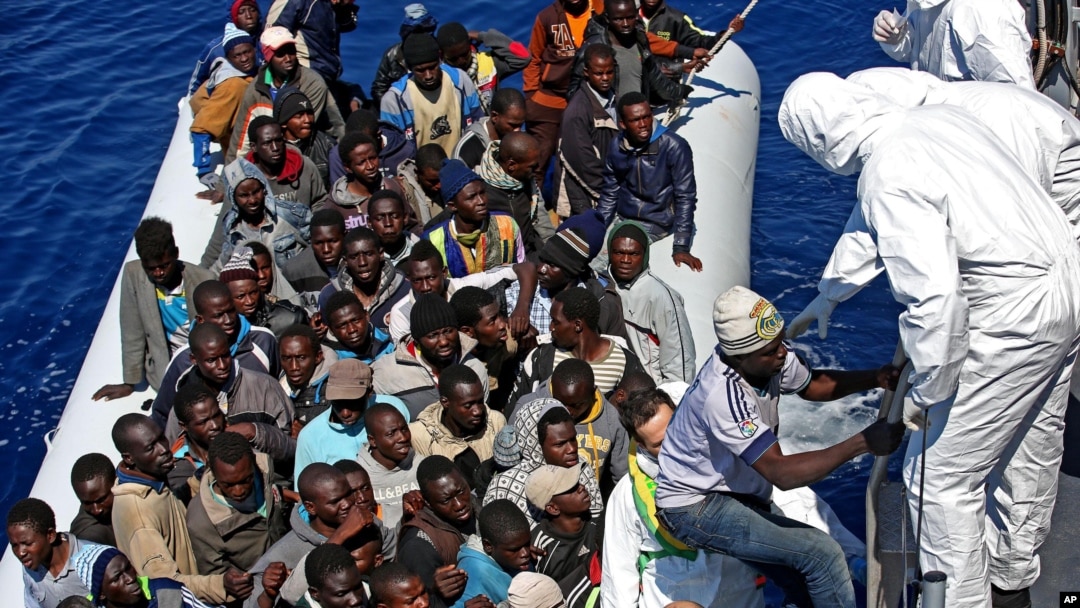The United Nations refugee agency has praised the European Union’s plans to triple its funding for maritime search-and-rescue operations in the Mediterranean, but said the key issue to refugee safety is access to asylum when fleeing violence in their own country.
The U.N. High Commission for Refugees said Friday that broadening search-and-rescue operations were "important first steps toward collective European action." But the agency urged the EU to provide other legal channels to protection to prevent refugees' deaths at sea.

Near the site where 14 migrants were killed by a train, others walk along tracks north of the central Macedonian town of Veles, April 24, 2015.
"Ultimately the test will be whether we see reduction in lives lost, effective access to protection in Europe without having to cross the Mediterranean, and an effective Common European Asylum System, which truly lives up to its commitments of solidarity and responsibility-sharing," the agency said in a statement, Reuters reported.
The UNHCR said about half the migrants who crossed the Mediterranean to reach Europe last year were trying to escape war or persecution in Africa and the Middle East.
Roughly 35,000 asylum seekers and migrants have landed in Europe so far this year, according to the Associated Press, and at least 1,800 have died. That compares with a death toll of apprxoximately 100 at the same point in 2014.
Broader aid lauded
Europe's own border protection agency, Frontex, also welcomed the decisions, which resulted from an emergency meeting on migrant safety Thursday in Brussels.
The emergency meeting of European leaders Thursday was a direct response to Sunday’s capsizing of a boat off the Libyan coast. Approximately 900 people are believed to have drowned in Europe's worst migrant disaster.
The vessel’s 27-year-old Tunisian captain, one of just 28 survivors, was in court in the Italian city of Catania Friday to face charges of causing the disaster by accidentally ramming a fishing boat.
As Europe focused on the problem of migrants at sea, 14 traveling by land through central Macedonia late Thursday were hit and killed by a train as they took a commonly used land route through the Balkans to reach western Europe. Macedonia's state prosecutor said it appears that most members of the group were from Somalia and Afghanistan.
The migrants were walking along the train tracks after dark near the town of Veles when they were hit by an express passenger train on its way to the Serbian capital, Belgrade.
Collective action seen as key
UNHCR spokesman Adrian Edwards says collective action is the only approach that can stop the intensifying tragedy playing out on Europe’s southern frontiers.
He adds it is crucial that humanitarian and human rights principles are at the center of Europe’s approach.
“The boat crossings are not just a migrant phenomenon, they are a refugee one too. Half those who crossed the Mediterranean in 2014 were people seeking refuge from wars and persecution. And for refugees fleeing war, there has to be some alternative to having to cross the Mediterranean in smugglers boats," says Edwards.
The UNHCR says the EU summit failed to comprehensively address issues such as the resettlement and relocation of refugees, and the creation of channels for safe and regular migration.
It notes European governments also have not committed themselves to sharing the burden of resettling survivors. Currently, most of the migrants are being received and assisted by Italy, Greece and Malta.
More funding to patrol borders
The European Union announced its intention to boost border-patrol funding after Thursday's emergency meeting in Brussels.
Additionally, French President Francois Hollande said he will seek a United Nations resolution authorizing the EU to destroy boats used by smugglers to ferry thousands of migrants from North Africa to Europe.
Ahead of the summit, the United Nations had called on the 28-nation EU bloc to demonstrate leadership in the face of "a tragedy of epic proportions," while the rights group Amnesty International described the proposals under consideration Thursday as "woefully inadequate."
About 150,000 migrants reached Italy last year. Rome said Wednesday that 5,000 could reach its shores each week over the next five months and as many as 200,000 by year’s end.
Since the defunding of a 2014 EU migrant rescue program, Italy has shouldered most of the burden of rescuing migrants at sea because of its geographical proximity to northern Africa. Analysts predict the number of drowning deaths will continue to rise, unless rescue efforts are either increased or the flow of migrants severely curbed.
European officials have voiced their sympathy at the loss of lives in the latest migrant capsize disaster. But some have said the answer to the crisis is not a more accommodating immigration policy, but better armed patrols to keep migrant boats from leaving Africa for the Mediterranean crossing to Europe.
Lisa Schlein contributed to this report from Geneva.


